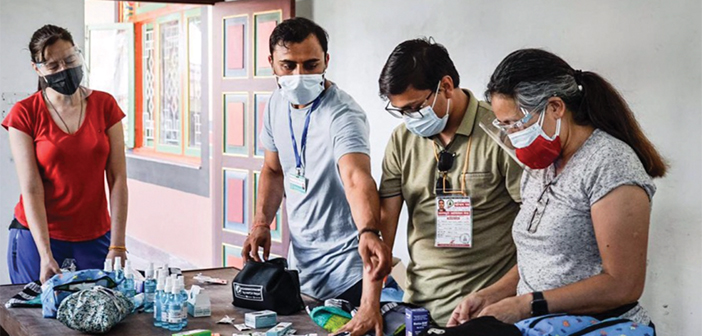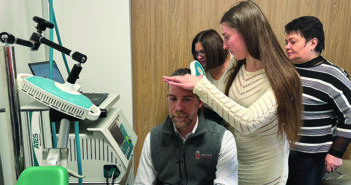COVID surge follows emergency medicine fellow from Rhode Island to Nepal.
Almost as soon as Ramu Kharel F’22, MD, arrived in Nepal in April as part of his Brown global emergency medicine fellowship, he found himself in the middle of a national crisis. A second wave of the COVID-19 pandemic was crashing over the Himalayan nation, causing its already-weak health care infrastructure to collapse.
“While the focus was on India, this country of nearly 30 million people was drowning in the pandemic,” Kharel says.
Just a few months before, Kharel—an affiliated fellow with Brown’s Center for Human Rights and Humanitarian Studies—had been treating COVID-19 patients in a Providence field hospital. But Rhode Island’s surge paled in comparison to Nepal’s, where some districts saw per capita cases as high as 90 percent, he says.
“There was a major lack of oxygen supply, testing was inadequate, very few people had received the vaccine, and ICU beds were rapidly filling up,” he says.
Before coming to Nepal, Kharel had participated in training sessions, organized by Brown and Project HOPE, on the principles of treating COVID-19. Once on the ground, he teamed with health care workers, government officials, and NGOs to provide relief strategies.
“We do not have enough to equip health care workers working on the frontlines to fight this pandemic, and one of the gaps is basic clinical management knowledge,” he says. Kharel led trainings for health care providers, advised local government leaders on COVID management protocol, and consulted with health centers on treatment and resource management.
“One four-hour video training was attended by 300 doctors, nurses, health workers around the country, which was the maximum number allowed on my Zoom,” he says. “With my NGO, HAPSA Nepal, we also conducted a two-hour training with a focus on isolation/surge center staff.” They then posted the videos online to reach a larger audience.
Kharel’s NGO raised $51,000 to build and distribute isolation kits to more than 2,000 families across the country. It was “the best way to keep infected people safe and comfortable at home,” he explains. “Nepal only has about 2,000 ICU beds and less than 700 ventilators,” Kharel says. “Also, much of the population lives in rural areas without easy access to medical care.”
Each kit included acetaminophen, cough syrup, rehydration fluid, surgical masks, sanitizer, soap, a thermometer, and a pulse oximeter. While the latter device made the kits more expensive, Kharel says, “it’s such a key item to help people either feel reassured that they can stay at home or that they need professional help.” After the pandemic, municipalities will collect the pulse oximeters and distribute them to local health centers that need them, he adds.
Kharel’s fellowship brought him to Nepal to study its emergency medicine programs. “The field is in its infancy,” he says. He was able to resume the research as the crisis subsided and returned to Providence in July.
“I was only supposed to be in Nepal for two months, but the Brown global division was super supportive in terms of flexibility,” Kharel says.




